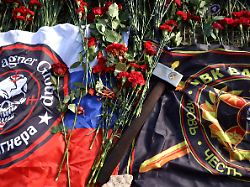Prigozhin made a name for himself as the head of one of the most brutal private armies in the world. Now the leader of the Wagner Group is dead – and the question arises as to who will be in charge of the lucrative mercenary business in the future.
“We will all go to hell. But in hell we will be the best,” Yevgeny Prigozhin once said in an interview published by the Wagner Group’s Gray Zone Telegram channel on Wednesday evening. After his private plane crashed, it became more and more likely that the Wagner boss could have followed his idea of death. His name was on the passenger list and both the private army and, most recently, President Vladimir Putin himself officially announced his death.
For many, Prigozhin’s death comes as no surprise. After the failed coup attempt two months ago, in which Prigozhin played a key role as the initiator, many experts considered his time numbered. At the time, Putin called him a traitor and he made it clear in an interview in 2018 that he cannot forgive traitors. There are many indications that the Russian President will take revenge.
Not only Prigozchin, but also Dimitri Utkin, Wagner’s official military chief, is said to be among the victims. Valeri Chekalov, who was responsible for operations in Syria and belonged to the management level, was also on the plane. With this, the Wagner Group not only loses its public face, but also the only other executives who could have replaced Prigozhin. The question therefore arises as to who could take over the business of the private army in the future.
One searches in vain for Wagner’s heir to the throne
Russia expert Nico Lange doubts that the militia had any kind of deputy system at all. “Prigozhin was in charge, nobody else,” he says in an interview with ntv.de. It wasn’t even planned that someone could take over his job when Prigozchin was gone. Rather, it looks as if the Wagner group as it existed prior to the June 26 mutiny is history. “That was clear from the moment Prigozhin called off the putsch,” said Lange.
In fact, Prigozhin’s role has been unclear in the two months since the mutiny. Actually, there was an agreement with Putin that the Wagner boss and his mercenaries would move to Belarus. But you hardly saw the 62-year-old there. Except for a few cryptic audio messages on Telegram, Putin’s former friend has remained silent. Most recently, he spoke up again for the first time via a video in which he said he was in Africa.
For Lange, the flight from Moscow to St. Petersburg is proof that the agreement between Putin and Prigozhin was never right. “Something different must have happened behind the scenes than what was publicly announced,” said the expert. Apparently, the Belarus deal was not only intended to deceive the public – but also Prigozhin himself. There is no other way to explain why the Wagner boss felt so safe that he boarded a plane with other leaders.
Profitable business in Africa
But Putin’s revenge comes later, as he has proved in the past. A poisoned tea, an unfortunate fall from the balcony, alleged heart attacks – the list of retaliatory killings is long. Prigozhin’s death could still have unpleasant consequences for Russia, says Russia expert and professor Gerhard Mangott from the Institute for Political Science in Innsbruck in an interview with ntv.de. In Africa and the Middle East, Wagner mercenaries ensure that Russian interests are enforced. “If Russia fails to continue this paramilitary presence in Africa, it will harm Russia.”
But the business in Africa is too lucrative for that – Putin doesn’t want to miss the stealing and selling of raw materials and other black deals. Political interests are also too important for Russia. “Then someone else will do the business,” predicts Lange. “In the Putin system, Putin decides who is allowed to do business and who is not.” According to the Russia expert, it is more likely that Putin has already deployed someone behind the scenes. As far as business in Syria is concerned, Russian forces are said to have already been integrated into the work after the coup.
At the front, Putin no longer needs mercenaries: after Prigozhin taunted the leadership of the Russian army, the fighters withdrew from the front two months ago. There was no collapse of the Russian defense.
The Kremlin has nothing to fear
The Kremlin boss need have no fear that the mercenaries might refuse to continue doing business for Putin or the Russian Defense Ministry. “We’re talking about mercenaries, some serious criminals, former prison inmates. I don’t think they have a lot of choice and ultimately go where they’re paid money,” says Lange.
According to experts, the Kremlin does not need to fear an act of revenge on the part of loyal Prigozhin supporters, as announced on the Gray Zone telegram channel. Having had to hand over all their weapons to Russia after the coup, they lack the military strength for serious action.
